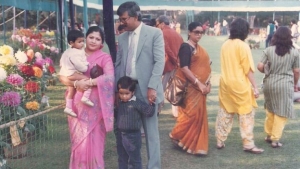Article by: BBC
 Ramanuj Basu passed the bar exam in Ontario – Copyright: COURTESU RAMANUJ BASU
Ramanuj Basu passed the bar exam in Ontario – Copyright: COURTESU RAMANUJ BASU
Last month, the BBC Canada team asked readers about their immigrant experience in Canada as the country celebrates its 150th anniversary. In this story, we look at the difficulty even highly-skilled immigrants face getting work.
Ramanuj Basu arrived in Canada in 2013, excited to begin a master’s degree in international business law.
At 29 years old, he had already studied law at the University of London, and had gained practical experience at a Delhi corporate law firm as a senior associate.
But Basu and his wife Veronika decided they wanted to try another country and chose Canada for the “quality of life”.
“We looked to it with excitement,” he says, even though they were leaving behind family and friends. “You’re making the move with great expectations.”
They knew there would be some sacrifice. Veronika worked two jobs to support the couple as Basu completed his degree at Toronto’s York University. Basu left behind his parents and sister in Delhi.
His father, Manoj, says they were “optimistic” about their success in a new country. Like so many other families separated by distance, he adds, modern communication is a blessing but not the same as seeing his son and daughter-in-law in person.
Basu knew he would need to prove his credentials. So he joined as a summer intern at a big business law firm, despite doing more advanced legal work in India.

Ramanuj Basu as a young boy in India with his family – Copyright: COURTESY RAMANUJ BASU
He qualified to practise law in Canada in 2016, but Basu hit a wall he wasn’t expecting – getting foreign credentials and work experience recognised.
“I have seen numerous examples of foreign qualified professionals struggling to re-enter their field and in some cases, being compelled to give it up due to financial pressures,” he says.
While Basu says Canadians are a “very accepting people” and “very helpful”, “professionally, it’s a different story”.
Many employers told Basu they appreciated his experience but couldn’t seem to find a way to make it fit into their organisation.
“No one is willing to recognise the previous experience I had in India,” he says.
Canada has long prioritised bringing in skilled immigrants and competes with countries like the UK and the US for their talents.
About 20% of the country is foreign-born and more than half of Canada’s immigrant population is highly educated.
People from India are a large part of that group. Between 2006 and 2011, more than 10% of the 1.2 million people who immigrated to Canada came from the south Asian country.
Still, skilled immigrants struggle in the labour market. They face higher unemployment rates and have lower wages than people who are Canadian-born.
Canada’s statistics agency says that in 2011, recent immigrants with a university degree earned 79% of the weekly wages earned by their Canadian-born counterparts.
The country also ranks below the OECD average when it comes to matching skilled immigrants to jobs.
The cost of licensing fees, exams and training upgrades for foreign credential recognition can also drain finances.
Basu says he would tell other new immigrants not to count on overseas experience when it comes to looking for a job in Canada, and thinks Indian companies value foreign experience more.

Toronto is among the most diverse cities in the world – Copyright: AFP
“They tend to view it as exposure to different cultures, different business practices, to different ways of doing things,” he says.
While the couple aren’t living quite the life they envisioned, Basu says they have settled in and plan to stay.
He eventually found a good job, working in global sanctions at a Canadian bank, though not in the legal profession as he had hoped. His wife has a full-time job and they’ve bought a flat in the Toronto area.
“I recognise the fact that I am doing far better than a lot of recent immigrants are,” he says, but adds it still wasn’t an easy experience.
He hopes employers will take a chance on people who pick up and move to another country to build a new life.
“It takes quite a bit of gumption and quite a bit of confidence in yourself, “he says. “Because you are stepping out from what you’re familiar with into the unknown. There’s merit in that.”
“You are showing you are willing to take on new challenges and adapt to them.”
Source: https://www.bbc.com/news/world-us-canada-
——————————————————————————————————————————————-
 To See if You are Qualify to Canada or Want To Win a Green Card to USA, please visit: http://www.i-immigration.com/en/qa/
To See if You are Qualify to Canada or Want To Win a Green Card to USA, please visit: http://www.i-immigration.com/en/qa/






